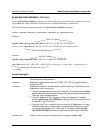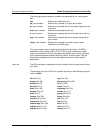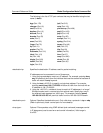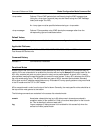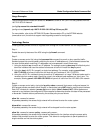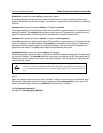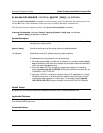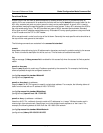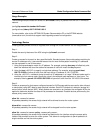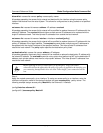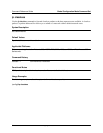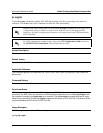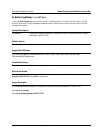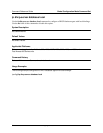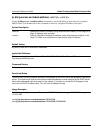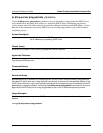
Command Reference Guide Global Configuration Mode Command Set
61200510L1-35E Copyright © 2005 ADTRAN 400
Usage Examples
The following example creates an access list UnTrusted to deny all packets from the 190.72.22.248/30
network:
(config)#ip access-list standard UnTrusted
(config-std-nacl)#deny 190.72.22.248 0.0.0.3
For more details, refer to the ADTRAN OS System Documentation CD or the ADTRAN website
(www.adtran.com) for technical support notes regarding access list configuration.
Technology Review
Creating access policies and lists to regulate traffic through the routed network is a four-step process:
Step 1:
Enable the security features of the AOS using the ip firewall command.
Step 2:
Create an access list to permit or deny specified traffic. Standard access lists provide pattern matching for
source IP addresses only. (Use extended access lists for more flexible pattern matching.) IP addresses
can be expressed in one of three ways:
1. Using the keyword any to match any IP address. For example, entering deny any will effectively shut
down the interface that uses the access list because all traffic will match the any keyword.
2. Using the host <A.B.C.D> to specify a single host address. For example, entering permit host
196.173.22.253 will allow all traffic from the host with an IP address of 196.173.22.253.
3. Using the <A.B.C.D> <wildcard> format to match all IP addresses in a “range.” Wildcard masks work in
reverse logic from subnet mask. Specifying a one in the wildcard mask equates to a “don’t care.” For
example, entering permit 192.168.0.0 0.0.0.255 will permit all traffic from the 192.168.0.0/24 network.
Step 3:
Create an access policy that uses a configured access list. AOS access policies are used to allow, discard,
or manipulate (using NAT) data for each physical interface. Each ACP consists of a selector (access list)
and an action (allow, discard, NAT). When packets are received on an interface, the configured ACPs are
applied to determine whether the data will be processed or discarded. Possible actions performed by the
access policy are as follows:
allow list <access list names>
All packets passed by the access list(s) entered will be allowed to enter the router system.
discard list <access list names>
All packets passed by the access list(s) entered will be dropped from the router system.
allow list <access list names> policy <access policy name>
All packets passed by the access list(s) entered and destined for the interface using the access policy
listed will be permitted to enter the router system. This allows for configurations to permit packets to a
single interface and not the entire system.



